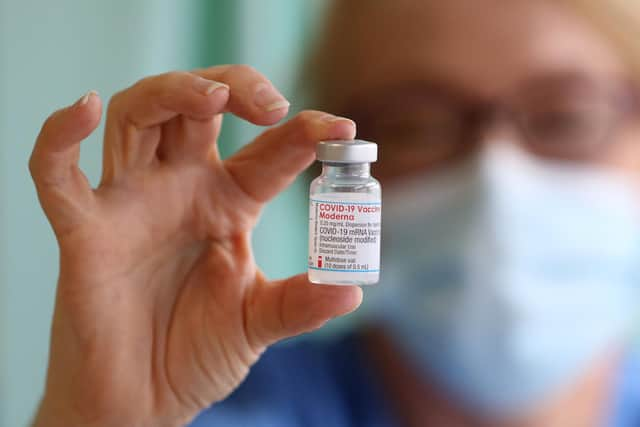First Moderna jabs to be given today as Covid-19 vaccination programme reaches new milestone
and live on Freeview channel 276
The roll out begins today, Tuesday, April 13, as the the NHS vaccination programme reaches another milestone, with more than 20 sites to initially use the vaccine.
For those aged 18 to 29 eligible for a jab, the Moderna vaccine provides another alternative to the AstraZeneca vaccine, in line with updated MHRA guidance last week.
Advertisement
Hide AdAdvertisement
Hide AdMore than 27 million people in England have now received their first jab, with more than 6.1 million second jabs also being given.


NHS medical director Professor Stephen Powis said: “We now have a third jab in our armoury and NHS staff will be using it at more than 20 sites from this week, with more coming online as supplies expand.
“England’s vaccination programme is our hope at the end of a year like no other, so please do come forward and get your jab when you’re invited.
“It is safe, quick and effective - it will protect you and your loved ones.”
Advertisement
Hide AdAdvertisement
Hide AdHealth and Social Care Secretary Matt Hancock said: “Vaccines have already saved more than 10,000 lives and have had a real impact on Covid-19 infection rates and hospitalisations across the UK.
“From today the NHS in England will begin using the Moderna vaccine, following the start of the UK roll out in Wales last week.
"The vaccine has already been used widely in other countries and approved by our medicines regulator as it met the highest standards of safety and effectiveness.”
Moderna, which can be stored for 30 days at normal fridge temperatures, along with Pfizer, will be used for some of the appointments rearranged for under 30s due to receive the AstraZeneca jab.
Advertisement
Hide AdAdvertisement
Hide AdDuring April the focus is on second doses, but appointments are available for those in the initial cohorts not yet protected.
People who had their first jab at a vaccination centre or pharmacy-led service should have a date for their second while those jabbed by a GP will be called back.
Anyone aged 50 and over can still arrange their jab, as well as those clinically vulnerable or a health and care worker, who should contact their GP, while surgeries are also calling unvaccinated patients personally to encourage uptake.